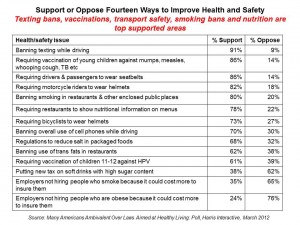While most Americans largely believe in motorcycle helmet laws, seatbelt-wearing mandates, and regulations to reduce sale in packaged foods, most are also concerned about the nation turning into the United States of Nanny.
 The Harris Interactive/Health Day poll of March 20, 2012, finds a health citizenry “pro” most public and safety regulations, from banning texting while driving to requiring the HPV vaccination (e.g., Gardasil). Specifically, as the chart shows,
The Harris Interactive/Health Day poll of March 20, 2012, finds a health citizenry “pro” most public and safety regulations, from banning texting while driving to requiring the HPV vaccination (e.g., Gardasil). Specifically, as the chart shows,
- – 91% of U.S. adults are for banning texting while driving
- – 86% are for requiring vaccination of young children against mumps, measles, and other diseases
- – 86% also like to require drivers and passengers to wear seatbelts
- – 82% want to require motorcycle riders to wear helmets
- – 80% want bans on smoking in public places
- – 78% want restaurants to show nutritional information on menus
- – 73% support mandatory wearing of helmets by cyclists
- – 70% want to ban the overall use of cell phones while driving
- – 68% would like to see mandated reduced salt in packaged foods, and 62% the banned use of trans fats in restaurants
Not so popular are employers not hiring people who are obese because it could cost more to insure them (supported by only 24% of U.S. adults), and employers not hiring people who smoke due to higher insurance costs (35%). Some 38% of Americans support the idea of a new tax on soft drinks with high sugar content – not a high public health priority to most U.S. consumers who probably have soda-drinking family members.
Notwithstanding big majorities who support these health initiatives, 61% of Americans are concerned that “laws, policies and programs like those listed are turning us into a ‘nanny state’ where we rely too much on the government to protect us from danger,” as the survey put the question. Harris Interactive finds this an “ambivalence” between beliefs about public health and safety versus fears of over-regulation.
Harris Interactive polled 2,211 U.S. adults 18 and over in February 2012.
Health Populi’s Hot Points: A big number in this survey is 81% – this majority view concurs that people should take personal responsibility for their own actions and be free to make their own decisions, even if they suffer as a result.
This is a very loaded question, which gets to the real nature of “public health” and the longtime argument that, “as long as it doesn’t hurt anybody, it’s OK with me.”
Public health is the gift we give each other by caring about the whole health of the nation: all people, regardless of where they live, the color of their skin, employment and socioeconomic status.
And the United States hasn’t had a full and open discussion about Public Health for decades. Public Health is like National Defense: you can’t pay for it by yourself. It is what we economists term a “Public Good.”
In the case of health, the “Good” is both a product — that is, the outcome of health for all — and “Good,” in that valuing Public Health is a very good thing indeed. If you read the Constitution as I do, living in Philadelphia where I have the honor of frequently visiting Independence Hall and pondering what the Founder Fathers might have had in mind, the words, “Life, Liberty, and Pursuit of Happiness” embody Public Health.
It is very difficult to pursue happiness without health.





 Grateful to Gregg Malkary for inviting me to join his podcast
Grateful to Gregg Malkary for inviting me to join his podcast  This conversation with Lynn Hanessian, chief strategist at Edelman, rings truer in today's context than on the day we recorded it. We're
This conversation with Lynn Hanessian, chief strategist at Edelman, rings truer in today's context than on the day we recorded it. We're